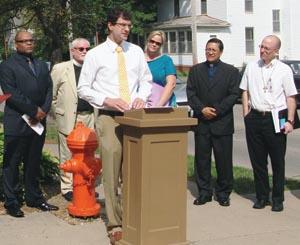
By Barb Arland-Fye
With a proposed Chicago-to-Quad Cities passenger rail project poised to move forward, Quad Cities Interfaith and its partners won’t wait until the train leaves the station to promote economic justice.
They’re organizing grassroots support for an initiative that guarantees the multimillion-dollar project employs low-income people and minorities and provides them with training to assure their success. Bishop Martin Amos of the Diocese of Davenport supports the initiative, as do members of other Christian, Muslim and Jewish communities, said Kent Ferris, the diocese’s social action director and Quad Cities Interfaith member.
The Quad City Rail Community Benefits Agreement calls for adequate relocation assistance for all homeowners, renters and small businesses targeted for relocation; reserving 30 percent of the workforce hours for low-income people, minorities and women; directing 1 percent of the project budget into job training and support programs; promoting green space usage; and ensuring that representation on a monitoring committee includes those affected by construction of a high-speed rail and station. The committee would have input in the formulation of all requests for proposals related to construction, training and other aspects of the project.
Bishop Amos’ support for this local economic justice effort coincides with an effort of the U.S. Conference of Catholic Bishops Administrative Committee, composed of more than 50 bishops. They asked their president, Archbishop Timothy Dolan, to write to every bishop and ask them to “do all you can to lift up the human, moral and spiritual dimensions of the ongoing economic crisis.”
In his Sept. 15 letter, Archbishop Dolan noted that 46 million people (15 percent) live in poverty in the United States and unemployment figures remain dismal. “ …(T)he common good will not advance; economic security will not be achieved; and individual initiative will be weakened when so many live without the dignity of work and bear the crushing burden of poverty. These economic failures have fundamental institutional and systemic elements that have either been ignored or made worse by political and economic behaviors, which have undermined trust and confidence.”
Seizing on local opportunities for economic justice, leaders from Quad Cities Interfaith have been meeting with and gathering information from public decision makers and stakeholders regarding the passenger rail project.
The initial $310 million passenger rail proposal envisioned service between Chicago and Iowa City. The states of Iowa and Illinois received a $230 million grant in October 2010 to move forward. But the project idled because Iowa Gov. Terry Branstad wants to conduct a long-range study on rail service that includes a link to Omaha. The Iowa DOT has now requested splitting the $230 million grant, of which $87 million was earmarked for Iowa.
Breaking the grant into two parts would allow the state of Illinois and the Federal Railroad Administration to move forward with construction of the Chicago-to-Quad Cities link, said Scott Vandewoestyne, director of government affairs for the Quad Cities Chamber of Commerce. Chamber officials anticipate the state agencies will sign a contract within the next couple of weeks, clearing the way for construction. “The train starts moving down the track, essentially,” Vandewoestyne said.
An estimated 700 to 800 jobs could be created with the project, as initially envisioned, said the Rev. David Geenen, transportation/jobs taskforce chair for Quad Cities Interfaith. Jobs would include construction, rail upgrade, building a station and ongoing maintenance and operation of trains and rail.
“We want everyone to have a place at the table with the jobs that are created. The way to do this is through the Community Benefits Agreement — that’s a legal, binding contract signed between a local community and the major developer for a project, in this case, the Illinois Department of Transportation.”
The entire Quad-City region in Iowa and Illinois stands to benefit, Ferris said. “Those counties will be affected by job development, more efficient transportation, and more people will be coming to the area.”
Grassroots support for the economic justice component of the project needs to continue, said the Rev. Geenen, pastor of 15th Avenue Christian Church in Rock Island, Ill. “One of the outcomes I’m seeing as a local pastor is building partnerships with pastors I wouldn’t normally come in contact with because of our separate ministries. We’re building power in the local community and lifting up the moral voice.”








